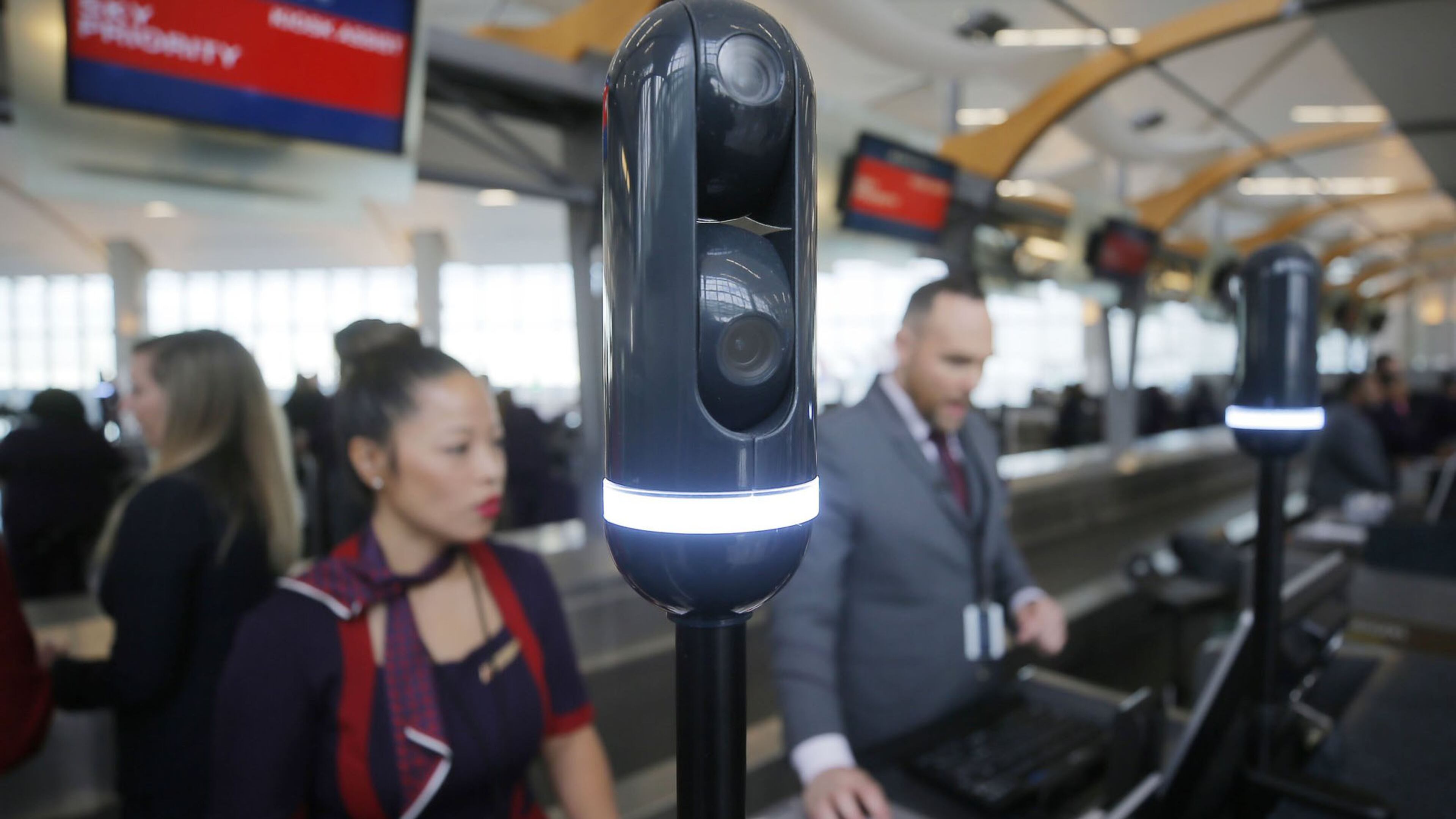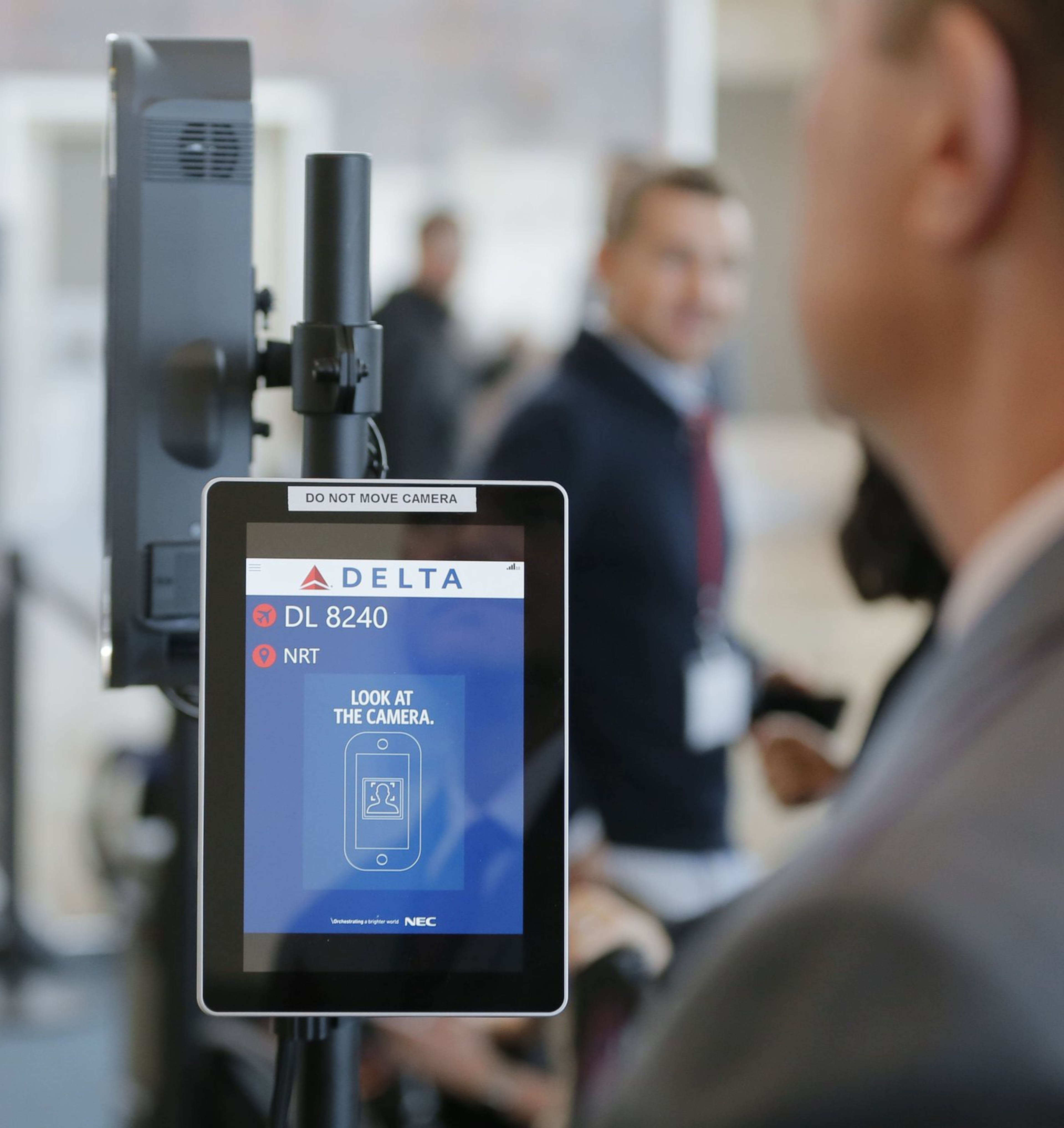As Delta expands facial scanning, opposition to technology grows

In Atlanta and a growing number of airports, travelers are having their faces scanned before checking in for an international flight at customs or at the boarding gate.
Delta Air Lines, which created what it calls its first biometric terminal at Hartsfield-Jackson International Airport's international terminal, sees facial recognition as a convenience for travelers because they don't have to pull out ID or a boarding pass at each checkpoint. And Delta is expanding the technology to other international hubs.
But there's a growing backlash to the use of facial recognition, and some activist groups are calling for a federal ban on law enforcement using the technology.
In partnership with U.S. Customs and Border Protection, Delta in the past few months has added facial scanning to the Atlanta airport's Concourse E, its Detroit hub, boarding gates in Minneapolis and Salt Lake City, and this month to Los Angeles International Airport.
Some other carriers have also started using the technology.
Atlanta-based Delta says it doesn't save or store biometric data, and passengers who don't want their face scanned can opt out. Delta says a test found that 72 percent of passengers prefer facial recognition to standard boarding.
The company issued a statement saying the technology went through "robust testing" and "is proven to be a secure, fast and highly accurate alternative to using a printed passport photo or boarding pass to complete the mandatory verification of an international traveler's identity."
Some of the biggest privacy concerns center on the use of facial recognition for surveillance. But Customs and Border Protection deputy assistant executive commissioner John Wagner, in July testimony to Congress, said the use of facial recognition with customs is to confirm photo IDs, which was already done manually.
It “simply replaces a manual identity check with facial comparison technology,” Wagner said.

Customs and Border Protection is looking to fulfill congressional mandates to record the arrival and departure of people who are not U.S. citizens by collecting biometrics.
And airports have turned to biometrics as a way to efficiently process ever-growing crowds of passengers while maintaining security.
Hartsfield-Jackson general manager John Selden said facial recognition technology needs to be embraced.
“If the federal government is running it, I think if there’s any concerns they’ll mitigate them,” Selden said. “The future is coming, so I think it’s going to be a great thing for the airport. … It’ll end up providing a safer environment because a document is forgeable. Your face is not.”
But an activist group called Fight for the Future said facial recognition is an invasive technology that can be used for surveillance.
“Facial recognition really doesn’t have a place in society,” said Evan Greer, deputy director of Fight for the Future. “It’s deeply invasive, and from our perspective, the potential harm to society and human liberties far outweigh the potential benefits.”
According to Fight for the Future, more than 30 organizations — including Greenpeace, MoveOn and the Council on American Islamic Relations — have endorsed the campaign to ban law enforcement use of facial recognition. Earlier this year, the group launched a website listing airlines that use facial recognition and those that do not.

Some people have raised concerns that if facial recognition databases were ever tampered with to commit identity theft, it could be even more difficult for victims to prove their identity if it has been tied to someone else's face.
“The other big concern here is that commercial airlines deploying this technology is normalizing the concept of getting our faces scanned to participate in society,” Greer said. “So you can imagine if we’re used to getting our face scanned to get on an airplane, then it’s only a matter of time before we’re used to getting our face scanned to go to the doctor” or to pick up a child at school.
While passengers can opt out of facial scans at the airport, “why wouldn’t the gate agent or the TSA agent then consider that to be suspicious?” Greer said.
The California Legislature and several cities, including Somerville, Mass., have in recent days and months approved some form of ban on city government or police use of facial recognition. So far the bans do not affect airlines’ use of facial recognition with customs at airports.
Biometrics are distinguishing biological traits that can be used to uniquely identify a person, which can include fingerprints, retina scans and facial recognition.
“Facial recognition is a fascinating technology with huge potential,” said U.S. Rep. Elijah Cummings, chair of the House committee on oversight and reform, at a hearing in May. “But right now it is virtually unregulated.”
He said while some cities have banned the government’s use of the technology, other cities, including Detroit and Chicago, are “rapidly expanding the use of facial recognition technology to track citizens in real time.”
“Private companies are using this technology more and more,” Cummings said. “There are virtually no controls on where this information goes.”
“More than half of American adults are part of facial recognition databases and they may not even know it,” he said.
“You could be at a rally supporting gun rights or protesting gun violence. You could be marching for the right to life or a woman’s right to choose. You could be pressing for the repeal of the ACA or the expansion,” Cummings said. “In all of these cases the government could monitor you without your knowledge and enter your face into a database that could be used in virtually unrestricted ways.”

Some contend that facial recognition technology misidentifies women and minorities at a higher rate than white males, “increasing the risk of racial and gender bias,” Cummings said.
Greer compared the technology’s potential risks to privacy violations in social media, such as Facebook’s sharing of users’ personal information with Cambridge Analytica.
“We rushed into social media and other technology companies’ products with open arms, and we’re now beginning to see the ways that some of these companies’ business models have profoundly undermined our democratic processes, our basic human rights, our privacy — and now we’re catching up,” Greer said. “I think people should approach facial recognition in airports with the same skepticism.”
On the other hand, Wagner, the Customs and Border Protection official, said the ability to verify the identity of passengers using different types of technology is needed to “further secure and enhance the traveler experience.”
On Monday, U.S. Senate intelligence committee vice chairman Mark Warner wrote a letter to the acting commissioner of Customs and Border Protection raising questions about a cyberattack in June involving the theft of thousands of travelers’ images. “It is absolutely critical that federal agencies and industry improve their track records, especially when handling and processing biometric data,” Warner wrote.
WHAT IT MEANS
Delta Air Lines and U.S. Customs and Border Protection are using facial recognition at the international terminal, Concourses E and F at Hartsfield-Jackson International Airport, for passengers flying Delta or a Delta partner direct to an international destination.
Those who want to opt out should tell an agent.
How it works:
» Enter passport information during online check-in.
» At a Delta kiosk in the check-in lobby, click “Look” on the screen to have a photo taken instead of scanning your passport. Or at a Delta counter in the check-in lobby, approach the camera at the counter next to the agent instead of showing your passport. (If you did not enter passport information during online check-in, you can scan your passport at the terminal.)
» There are also facial recognition cameras at the Transportation Security Administration checkpoint, where passengers flying internationally can show a boarding pass at the ID check, then stand in front of the camera.
» When boarding an international Delta flight with facial recognition, stand in front of the camera to have a photo taken instead of scanning a boarding pass.
» Travelers will still need to have their passports available and should always bring their passports when they travel internationally for use during their trip.
Source: Delta



